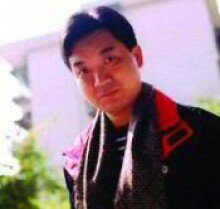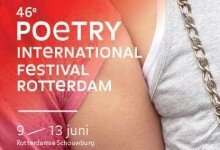
The events and energies of mundane, down-in-the-dirt reality inspire much of the poetry written in China today. However, against this imposing godlessness, Song Xiaoxian opposes a conspicuous religious element, and in poems written in plain, unmystical language he expresses his very personal sense of the divine.
The otherworldly, in Song’s experience, is a power or a feeling that occasionally disrupts the unremarkable routines of daily life. In the poem “Borrowed Light”, for example, it is the sight of some dawn-pink clouds that lend illumination to his ordinary life for a brief moment, and which compel him to murmur his “gratitude to Heaven”. Another poem, simply titled “God”, presents his idea of how the divine is connected to his own existence:
in a place my hearing cannot reach
a voice calls softly to me
in a place my seeing cannot reach
a pair of eyes watches me
in a place my skin cannot feel
gently a hand touches me
in a place I cannot imagine
someone is missing me
This religious dimension is perhaps also largely responsible for the strong social awareness apparent in Song’s work. He is not afraid to point out injustice. In “1958”, with the help of a few carefully deployed images, the poet sketches a damning response to the Great Leap Forward—a tragic example of Mao Zedong’s utopian politics that resulted in the death of millions of Chinese people from starvation. In another poem, “Notice”, he wonders aloud about the humanity of executing young criminals:
I saw 10 full-bodied characters in bold type
those printed names
had already been escorted to the execution ground
and shot, the youngest of them
was born in 1980
the notice was posted last August
it still looked fresh, the corpses of the dead criminals
had not yet decomposed
and were set to celebrate New Year
in the dirt
And so there is a noticeable see-sawing in Song’s poetry between the sweet and the bitter, between exultation and dismay. Not only does the inhuman treatment of people concern him; he also shows a compassionate interest in the way human beings relate to animals. In the whimsical short poem “Alarm Clock”, animals enjoy a tiny victory over the general human obsession with machines. In a longer poem, “The Jujube-Red Horse” (not translated here), Song describes an old horse’s friendly rapport with its owner:
it spends each night
out alone in the open
all sorts of things must happen to it during the night
but it’s always there again the next day
it says nothing, though perhaps
it has travelled a long way, helping a lost child
find his way home
or has crossed the Hailar River
with a girl, returning at dawn
to its old spot
nuzzling its owner . . .
On the other hand, in the awful, bleak poem “Enormous Appetite”, Song unsentimentally confronts the brutal fact of humanity’s insatiable hunger for animal flesh. In this Song has possibly been influenced by the small but growing ecological trend in contemporary Chinese literature and its attack on human-centred thinking.
Wisely, Song realizes that sadness is a saner source of poetry than joy or satisfaction. In “Bruises” he writes: at those times when I plunge into despair / my heart feels / pure, calm / sensitive and rich in heightened emotions / thanks to the cleansing power of tears. Although readers will find Song’s language plain to the point of prose at times, the sensitivity and heightened emotions of his poetry nearly adequately compensate for this shortcoming. It’s as it the poet deliberately pares down his words in order to create a shocking contrast between what he feels and thinks, on the one hand, and the linguistic means he uses to express himself. The poem “Blind Girl”—which reworks the cliché of love being blind—is a startling demonstration of this approach.
Song Xiaoxian is a relatively new poet. Born in Hubei province, he graduated from the Chinese department of Beijing’s Capital Normal University in 1989 and began writing poetry in 1992. He has published two individual collections to date, and is regularly published in anthologies such as the Chinese New Poetry Yearbook. He currently lives in the city of Guangzhou where he works for a newspaper.
Bibliography
Meng de gesheng (Dream of singing). Poems.
Kaishi (Beginnings). Poems by eight poets.
Malan kaihua ershiyi (On the aster twenty-one flowers bloom). Poems.
Also on this site
Sincerity and Resistance to Suffering at Our Backs
Essay about Song Xiaoxian.







